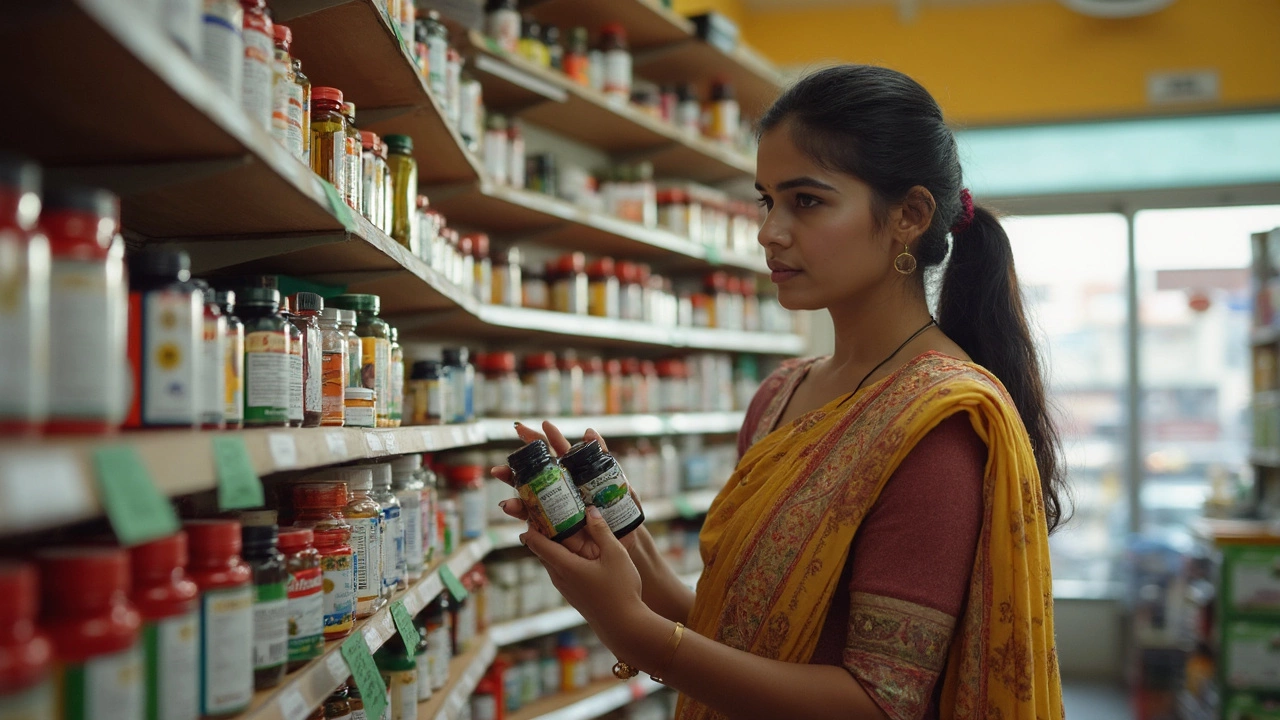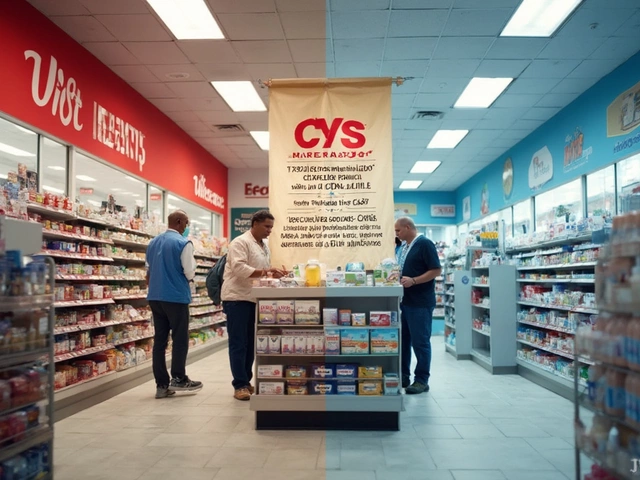- Home
- ::
- Best Herbal Supplement Company: How to Really Choose

Best Herbal Supplement Company: How to Really Choose
Ever wandered into a store or scrolled endlessly online—wondering if that herbal supplement brand is the real deal, or just selling hope in a bottle? There’s way more going on than slick packaging or the trending name popping up on social media. Loads of companies say “natural” and “pure,” but that doesn’t always mean safe, or even effective.
Start with this: not all herbal supplements are created equal. Some companies take shortcuts—using cheap fillers, questionable sourcing, or skipping proper safety tests. And yeah, a few actually mix up what’s printed on the label and what’s inside the bottle (it happens more than you think). So how do you spot the best herbal supplement companies? There are red flags and green lights to look for, and it’s not rocket science once you know what to check.
Let’s kick things off by figuring out why company reputation should even matter to you, and how to tell if a brand actually stands behind its products or just wants your cash.
- Why Company Reputation Matters
- Decoding Labels and Certifications
- Sourcing: Where Herbs Really Come From
- Testing, Purity, and Transparency
- Popular Brands Compared
- Tips for Buying Smart
Why Company Reputation Matters
You might think grabbing the biggest name or the cheapest bottle gets the job done, but with herbal supplements, brand reputation can honestly make or break your health results. This isn’t just about who shouts the loudest in ads—it's about companies that stick to what they promise, batch after batch.
The best herbal supplement companies get trust the hard way: they earn it. If you see a company getting called out for shady stuff—like mislabeling herbs or skipping safety testing—run the other way. In the U.S., the FDA doesn’t pre-approve supplements before they hit the shelves. So, it’s all about trusting the company to do what’s right, not just what’s legal.
One thing: companies with a solid track record are way less likely to get in trouble for product recalls or bad batches. In fact, a 2022 ConsumerLab survey found that brands with poor reputations had four times more recalls than trusted ones. Check out the table below for a taste of how reputation links to recalls:
| Brand Reputation | Avg. Recalls (2021-2024) |
|---|---|
| Highly Trusted | 1 |
| Questionable/Low Trust | 4 |
Here’s what to look for if you want to avoid regret:
- Consistent positive reviews across independent sites—not just company websites
- Transparency about their sourcing and testing process
- No recent history of recalls or regulatory warnings
- Brands that respond to customer complaints and questions (check their social media, it’s sometimes brutal there)
- Long-time industry presence—companies around for ten years or more have more to lose if they mess up
Reputation isn’t a vibe—it’s built on years of trust, quality, and people actually getting results from their herbal supplements. Don’t let clever ads fool you. Look for real, consistent feedback and honesty from the companies you trust with your health.
Decoding Labels and Certifications
Reading labels can feel like wading through a mess of buzzwords and fine print. When it comes to herbal supplements, though, this stuff isn't just for show—the details on the bottle can tell you a lot about quality, safety, and what's actually inside.
First off, check the supplement facts panel. It should list the exact herbs, how much of each is in a serving, and whether it’s a whole herb, standardized extract, or just a blend. If you see mystery blends or “proprietary formula” with no clear breakdown, that’s usually a bad sign.
- USDA Organic: This tells you the herbs are grown without synthetic pesticides or fertilizers. Watch out, though—seeing the word “organic” without this seal means nothing.
- Non-GMO Project Verified: This means the plants weren’t genetically engineered. If you care about natural sourcing, it's worth a look.
- NSF Certified or USP Verified: These spots test products for quality and purity. If you see their seals, it’s a green light for safety and no weird extra ingredients.
Got allergy worries, like gluten or dairy? Look for “allergen tested” or “free-from” labels, but make sure there’s actual third-party certification. Otherwise, it might just be clever marketing.
Seriously, ignore phrases like “doctor recommended” or “clinically proven” unless there’s a real study, and check for a QR code or website link to back up their claim.
Lots of companies toss meaningless badges on their bottles, so here’s a quick table showing certifications that actually count:
| Certification | What It Means |
|---|---|
| USDA Organic | Organic growing, no synthetic chemicals |
| USP Verified | Tested for purity and accurate labeling |
| NSF Certified | Meets strict quality and safety standards |
| Non-GMO Project Verified | No use of GMOs in ingredients |
At the end of the day, the best herbal supplement company will happily show how they source, test, and certify their products. No secrets, no vague claims—just straightforward info you can trust.
Sourcing: Where Herbs Really Come From
If you care about what you’re actually swallowing, you need to look at where the herbs in your herbal supplements come from. Sourcing isn’t just about which country; it’s about the farming, the handling, and even the timing of harvest. Some big-name companies cut corners and buy herbs grown with heavy pesticides or in polluted areas—usually abroad, like parts of China or India. While plenty of quality herbs come from those regions, you have to ask if your supplement brand is actually checking for quality, or just chasing the lowest price.
You want companies that spell out their sourcing—like saying their ashwagandha is “organic, grown in Rajasthan, India” or their turmeric is from “family-run farms in southern India.” These little details show they care about quality over cost. Look for the words “wildcrafted” (herbs harvested in the wild) or “ethically sourced,” but don’t just take those phrases at face value. Sometimes they’re just buzzwords unless the company backs them up with real certifications or lab results.
Here’s a quick table giving you an idea of how sourcing and quality control can differ between typical brands and higher-quality supplement companies:
| Type of Company | Herb Sourcing Details | Quality Control |
|---|---|---|
| Generic Mass Market | Bulk from brokers, often China/India, little info | Basic visual checks, rare lab testing |
| Premium/Organic Brand | Direct partnerships with farms, regions named, organic/wildcrafted | Third-party labs, in-house testing, batch tracking |
If a herbal supplement company is open about who grows their herbs and how they’re harvested, that’s a green flag. Some solid brands even visit farms themselves, making sure soil isn’t contaminated and plants aren’t loaded with pesticides or heavy metals. After all, an organic certification is only as good as the follow-through. Pro tip: if a company dodges questions about sourcing, move on. There are better options out there.

Testing, Purity, and Transparency
Ever wonder what’s really inside that bottle of herbal supplements? It’s not just about which herb they use—it’s how clean it is, if it’s actually what’s on the label, and whether the company is honest about it. The best herbal supplement companies aren’t shy about showing you their work.
Here’s where testing comes in. Reputable companies put their products through rigorous third-party testing. That basically means an outside lab (not run by the brand) checks if the supplement has the right ingredients, in the right amounts, and without nasty extras like pesticides, heavy metals, or mold. FYI, in a 2023 ConsumerLab test, about 20% of herbal brands failed purity checks—mostly for inaccurate ingredient amounts or contamination.
If a supplement company is proud of its results, it’ll make that easy for you to find. Look for brands that:
- Share Certificates of Analysis (COAs) for each batch—these show actual lab results.
- Clearly list their test partners (like NSF International, USP, or Eurofins).
- Publish product ingredient sourcing and testing info right on their website.
- Quickly answer questions about what’s in their products if you email or call.
Poor quality brands? They dodge your questions, hide the details, or slap vague claims like “fully tested” without proof. That’s a huge red flag, especially if you’re dealing with something you’re swallowing every day.
Here’s how some leading supplement brands stack up on transparency and testing:
| Brand | Third-Party Tested? | COAs Available? | Full Ingredient Disclosure? |
|---|---|---|---|
| Gaia Herbs | Yes | Yes | Yes |
| Nature’s Way | Yes | On request | Yes |
| NOW Foods | Yes | No | Yes |
| Smaller online brands | Sometimes | Rarely | Sometimes |
Keep this in mind: real herbal supplement quality isn’t just about fancy words like “organic” or “pure.” It’s about proof—actual paperwork, real test results, and open communication from the company. If a brand keeps info hidden or makes you hunt for answers, skip it. You deserve to know exactly what you’re getting.
Popular Brands Compared
This is where things get real. When searching for the best herbal supplement company, you’ll bump into some familiar names: Gaia Herbs, Nature’s Way, NOW Foods, and Himalaya, to name a few. But what actually sets them apart? It’s not just about which one spends the most on ads.
Gaia Herbs talks a lot about farm-to-bottle transparency. They put a QR code on their packaging; you scan it, and see exactly where your herbs were grown, with lab test results. This is a big green flag for anyone who cares about what’s actually in the bottle. Most of their stuff is non-GMO and certified organic, which legit matters if you want fewer pesticides in your body.
Nature’s Way has been around forever. They’re heavy on third-party certifications, especially NSF and TRU-ID. That means their labels actually match what’s inside—super important, since fake labeling is a dirty secret in the world of herbal supplements. They also source ingredients from worldwide farms, and while some formulas are organic, many aren’t. So, always check those details if they matter for you.
NOW Foods stands out for affordability and massive product range. One cool thing: their manufacturing is certified by UL (a global safety leader), which adds a layer of trust on quality controls. They run spot-checks on every batch, and their allergen declarations are very transparent. One thing to note though—their pricing means some ingredients might not be the absolute premium grade, but the quality testing is really solid.
Himalaya is a big deal for anyone into Ayurvedic herbs. Their products are clinically studied (check their ashwagandha research), and many of their raw materials come from sustainable Indian farms. They avoid synthetic additives in most items, and prioritize full-spectrum herbal extracts.
Take a look at this quick comparison of top brands:
| Brand | Transparency | Certifications | Price Range | Standout Traits |
|---|---|---|---|---|
| Gaia Herbs | QR code, full ingredient tracking | USDA Organic, Non-GMO | $$$ | Farm-to-bottle, high traceability |
| Nature’s Way | Clear sourcing, TRU-ID | NSF, Non-GMO | $$ | Long history, global sourcing |
| NOW Foods | Batch testing, allergen info | UL, Non-GMO | $ | Budget-friendly, huge selection |
| Himalaya | Batch traceability | ISO, Non-GMO | $$ | Ayurvedic formulas, clinical studies |
If you want the cleanest supply chain, Gaia wins. Budget-focused with solid quality? NOW Foods. If tradition and science are your thing, check Himalaya. Nature’s Way kinda nails it for mainstream safety and solid certifications. No matter which herbal supplement brand you eyeball, always double-check anything labeled “certified,” and make sure that it’s not just marketing fluff.
Tips for Buying Smart
If you want to get serious about choosing the best herbal supplement company, you’ve got to dig a little deeper than who has the flashiest bottle. Here’s what actually works when you want safe, reliable supplements that do what they claim.
- Check for transparency. Only trust brands that tell you exactly where they get their herbs. If you can’t find info about ingredient origin, steer clear. Companies like Gaia Herbs and NOW Foods actually print lot numbers on their bottles, so customers can trace their order’s background.
- Hunt for third-party testing. There’s hype about fancy formulas, but you should look for labels showing third-party certifications, like NSF, USP, or the Non-GMO Project. This means outside companies have checked for potency and contamination. According to Consumer Reports, "Nearly 30% of tested supplements had issues with mislabeling or contamination in the last five years."
- Know your certifications. Just because a bottle says 'organic' or 'natural' doesn’t guarantee quality. Legit certifications, such as USDA Organic or Non-GMO Project Verified, carry real weight. Anything else is just marketing noise.
- Ask about testing methods. If a supplement brand can’t say how they test products or how often, that’s a red flag. Responsible companies talk about heavy metal screening, pesticide checks, and microbial testing.
- Avoid miracle claims. If a label says it cures everything or promises instant results, it’s probably not trustworthy. Stick with companies that use straightforward, realistic language about benefits. No herbal capsule can replace a balanced lifestyle.
- Consider price—but don’t go for the cheapest. High-quality herbal sourcing, real testing, and certifications cost money. Ultra-cheap supplements often cut corners somewhere.
Here’s a quick overview showing common checks and what they really mean:
| Label/Certification | What It Means |
|---|---|
| USDA Organic | Fewer pesticides, grown to federal standards |
| USP Verified | Independent testing for purity and potency |
| Non-GMO Project | No genetically modified ingredients |
Don't skip this old-school move: actually talk to your doctor or pharmacist, especially if you take prescriptions. Herbal supplements can interact with meds—something supplement bottles don’t always warn you about.
“Dietary supplements are regulated differently from conventional foods and drugs,” says the U.S. Food and Drug Administration. “It’s important to be an informed consumer and to know that ‘natural’ does not automatically mean ‘safe.’”
So, next time you shop for a herbal supplement, keep these tips in your back pocket. The right brand relies on honesty, backed up by real testing and clear sourcing—not just clever marketing.

 Health and Wellness
Health and Wellness





Write a comment